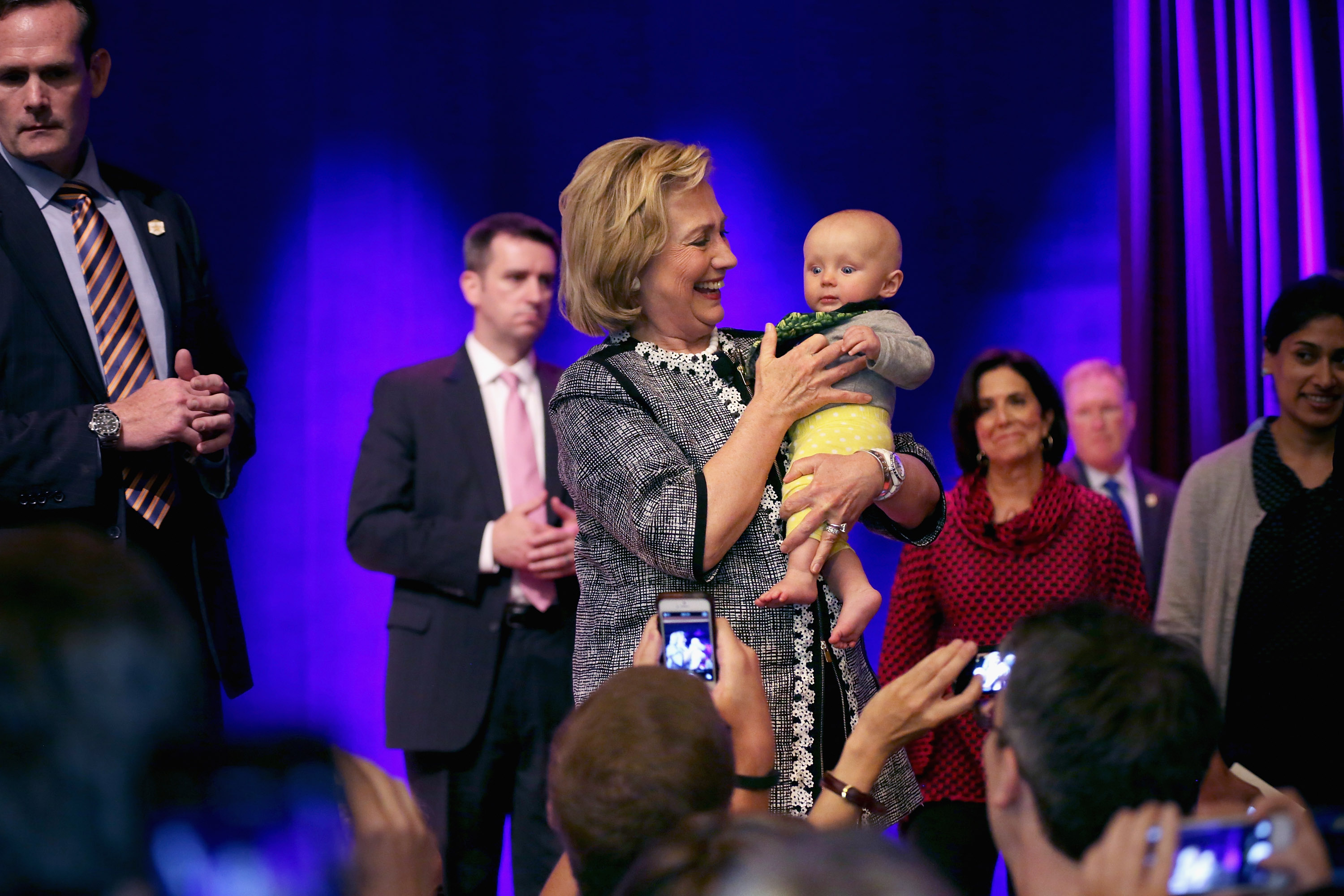Dear Hillary: Don't soften your image
For the sake of gender equality, you do you


A free daily email with the biggest news stories of the day – and the best features from TheWeek.com
You are now subscribed
Your newsletter sign-up was successful
Hillary Clinton is running for president, and I am all in.
I will readily admit this, too: My allegiance has little to do with Clinton's political abilities or policy preferences, and has almost everything to do with the fact that she is a driven, hard-working, enormously successful woman who stands a very good chance of becoming our first female president. It really is long past time for someone to shatter the "highest, hardest glass ceiling" in America.
But here's the rub: For a Clinton campaign (and presidency) to be a true success for gender equality, the longtime politician must remain unapologetically herself. That means embracing all of those supposed negative attributes that make Clinton the driven, hard-working, enormously successful woman that she is. She's ambitious. She's independent. She's bossy. And yes, she's even bitchy. Clinton should own it all, and we ought to respect her for it.
The Week
Escape your echo chamber. Get the facts behind the news, plus analysis from multiple perspectives.

Sign up for The Week's Free Newsletters
From our morning news briefing to a weekly Good News Newsletter, get the best of The Week delivered directly to your inbox.
From our morning news briefing to a weekly Good News Newsletter, get the best of The Week delivered directly to your inbox.
And yet, here we are, just days into Clinton's presidential run, and the focus is already on the texture of her image. Her first campaign video, which is devoted to a bevy of diverse middle-class families sharing their plans and dreams, is meant to "soften the edges of an image that is more firmly set than that of any other 2016 contender from either party," according to Susan Page at USA Today. A GOP strategist was quick to declare of Clinton: "She does not have that natural ability to commune and connect with people and you can't manufacture that." In that vein, Saturday Night Live's Hillary Clinton is a frightening, power-hungry automaton.
Team Clinton seems to have bought into this, too, hiring Kristina Schake, credited with making Michelle Obama into the much-adored "everywoman" who challenges Jimmy Fallon to a push-up contest. Schake is expected to work such image magic on Clinton as well.
This is nothing new. For Clinton's entire career in the public eye, she has been plagued by demands — from the media, voters, and critics — to dial down what makes her unique and successful. America has long failed to accept Clinton for who she is. We expect her to change — or at least to pretend to.
Clinton was never a typical political wife. She graduated at the top of her class at Yale Law — ahead of Bill — and was the family breadwinner in Arkansas, becoming the first female partner at the state's leading law firm. During her husband's 1980 gubernatorial run, Clinton's maiden name became a target for a Republican opponent. Following Bill's loss, Hillary officially took the Clinton name. Shortly thereafter, ahead of Bill's 1982 gubernatorial campaign, Clinton was given an "Arkansas Makeover" of frosted hair, contact lenses, and stretched vowels.
A free daily email with the biggest news stories of the day – and the best features from TheWeek.com
When the Clintons hit the national stage, she had to work even harder to prove herself a mother and homemaker, in addition to a career woman. During the 1992 campaign, when the Clinton marriage was blasted as more of a political "merger" than a loving relationship, it was the off-putting Hillary, the "hall monitor," who shouldered the blame. Her off-the-cuff remark that she chose to pursue a legal career in Arkansas when she "could have stayed home and baked cookies and had teas" as the governor's wife practically derailed her husband's run. Thereafter, Clinton reframed her potential role in the White House as being "a voice for the children" — an inoffensive, first lady-like phrase that fit neatly with past political wives.
Now more than ever, Clinton doesn't need these makeovers. In fact, such image adjustments would do her — and America — an enormous disservice. To soften Clinton's image is to hide the reality of what it takes for women to succeed at the highest levels. You don't become one of the country's top 100 lawyers by being cuddly and nice. You don't become the only first lady in American history to seek political office without being confident. You don't serve as a senator, run for president, serve as secretary of state, and run for president again without being extraordinarily ambitious. We ought to celebrate Clinton for these traits, not ask her to mask them.
This is the "Lean In" era. There are more women in Congress, in the workplace, and in high-ranking positions than ever before. To get there, women have had to throw elbows and be brash, just as men have forever. The path to power is not one that women tend to step daintily through in high heels and an apron. Nor do they ride across it on the wings of a "have it all" unicorn. They pursue their careers with aggression, table their social lives, and have children later in life, if at all.
This is obviously not a path for all women, nor should it be. But those like Clinton who choose it often do so because they are tough and ambitious. They have something to say and demand to be heard. America needs this diversity of voices and ideas. Female role models shouldn't kowtow to dated expectations of how a woman should act or speak. That's not what we expect of our leaders. We want to follow leaders who are steely enough to make the tough decisions, even when they're unpopular. We insist that our leaders be aggressive and direct. We demand that they stand up for what's right and good, even when it's hard.
If, in the face of a berating public and long campaign cycle, Clinton concedes to the pressure by polishing her image and warming her tone, we will make little progress in gender equality — even if she wins. We need female role models who proudly display the attributes required of the hard-won leadership positions they seek. Anything less wouldn't get the job done ��� nor would it inspire like-minded women to choose the arduous path less taken.
And so, Hillary Clinton, for women's progress, you do you.
Lauren Hansen produces The Week’s podcasts and videos and edits the photo blog, Captured. She also manages the production of the magazine's iPad app. A graduate of Kenyon College and Northwestern University, she previously worked at the BBC and Frontline. She knows a thing or two about pretty pictures and cute puppies, both of which she tweets about @mylaurenhansen.
-
 Film reviews: ‘Send Help’ and ‘Private Life’
Film reviews: ‘Send Help’ and ‘Private Life’Feature An office doormat is stranded alone with her awful boss and a frazzled therapist turns amateur murder investigator
-
 Movies to watch in February
Movies to watch in Februarythe week recommends Time travelers, multiverse hoppers and an Iraqi parable highlight this month’s offerings during the depths of winter
-
 ICE’s facial scanning is the tip of the surveillance iceberg
ICE’s facial scanning is the tip of the surveillance icebergIN THE SPOTLIGHT Federal troops are increasingly turning to high-tech tracking tools that push the boundaries of personal privacy
-
 The billionaires’ wealth tax: a catastrophe for California?
The billionaires’ wealth tax: a catastrophe for California?Talking Point Peter Thiel and Larry Page preparing to change state residency
-
 Bari Weiss’ ‘60 Minutes’ scandal is about more than one report
Bari Weiss’ ‘60 Minutes’ scandal is about more than one reportIN THE SPOTLIGHT By blocking an approved segment on a controversial prison holding US deportees in El Salvador, the editor-in-chief of CBS News has become the main story
-
 Has Zohran Mamdani shown the Democrats how to win again?
Has Zohran Mamdani shown the Democrats how to win again?Today’s Big Question New York City mayoral election touted as victory for left-wing populists but moderate centrist wins elsewhere present more complex path for Democratic Party
-
 Millions turn out for anti-Trump ‘No Kings’ rallies
Millions turn out for anti-Trump ‘No Kings’ ralliesSpeed Read An estimated 7 million people participated, 2 million more than at the first ‘No Kings’ protest in June
-
 Ghislaine Maxwell: angling for a Trump pardon
Ghislaine Maxwell: angling for a Trump pardonTalking Point Convicted sex trafficker's testimony could shed new light on president's links to Jeffrey Epstein
-
 The last words and final moments of 40 presidents
The last words and final moments of 40 presidentsThe Explainer Some are eloquent quotes worthy of the holders of the highest office in the nation, and others... aren't
-
 The JFK files: the truth at last?
The JFK files: the truth at last?In The Spotlight More than 64,000 previously classified documents relating the 1963 assassination of John F. Kennedy have been released by the Trump administration
-
 'Seriously, not literally': how should the world take Donald Trump?
'Seriously, not literally': how should the world take Donald Trump?Today's big question White House rhetoric and reality look likely to become increasingly blurred
